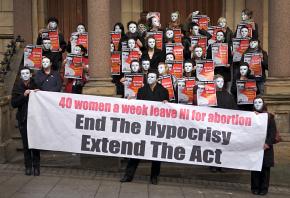Double standard on abortion
Irish socialist asks why the UK government has a double standard when it comes to promoting access to safe, legal abortion in Northern Ireland.
DFID WILL have to move quickly if it wants the same rights for women in Northern Ireland as it wants for women elsewhere in the world.
DFID is the UK's Department for International Development. Last week, it launched updated guidelines for its work to make abortion safer for women across the developing world:
In countries where abortion is legal, DFID will support programs that make abortion more accessible. In countries where it is illegal...DFID will make the consequences of unsafe abortion more widely understood and will consider supporting processes of legal and policy reform.
As International Development Minister Mike Foster explained:
Every year, a devastating number of women die because of unsafe abortion. If we ignore this, the stark reality is that millions more women will suffer, and backstreet practices will continue to increase the pressure for treatment on already overburdened health services...
The Department for International Development will continue to support the prevention of unsafe abortion as part of broader efforts to improve sexual and reproductive health...DFID supports safe abortion on two grounds. First, it is a right...Second, it is necessary.

But not in Northern Ireland, apparently.
The government of which Mr. Foster is a member refuses to consider intervention to assert the same right and meet the same necessity in a region that remains constitutionally part of the UK, while advocating safer and more accessible abortions in Africa, Latin America, south Asia and other farflung places where the UK has no jurisdiction.
THE CONTRADICTION is not new. While secretary of state for Northern Ireland, Mo Mowlam told the campaigning group Alliance for Choice that while she personally supported the right to choose and favored the extension of the 1967 Act, she didn't think it politic to push her views for fear of "stirring up the tribal elders."
This aspect of the issue hadn't been considered decisive in relation to Scotland, where, although the Holyrood parliament has much wider powers than the Stormont Assembly, including control of justice, abortion remains within the remit of Westminster, and the 1967 Act is the law of the land.
Westminster took this view at the time of Scottish devolution because--rather than in spite--of the fact that Scotland isn't entirely lacking in tribal elders either.
Just this week, David Kerr, the Scottish National Party candidate in the Glasgow North East by-election triggered by the resignation of Commons Speaker Michael Martin, declared that abortion should be banned in Scotland, even when the pregnancy has resulted from rape, incest or child abuse.
The Catholic bishops and leaders of fundamentalist Protestant churches sing from the same hymn-sheet--one of the reasons Westminster won't abandon the current arrangement.
It's recognized at Westminster that on this issue, the Scottish elders don't speak for the tribes. All the evidence suggests the same applies here. But in the case of the North, Westminster refuses to recognize the fact and has set its face against the extension of the 1967 Act. And it won't contemplate the exclusion of abortion from the devolution of justice.
There are tribal elders elsewhere. DFID operates in Brazil, where the Catholic Church claims 76 percent of the population as members. The church's opposition to abortion is unambiguous and loudly proclaimed.
In March, Archibishop José Cardoso Sobrinho of Recife excommunicated the mother of a 9-year-old who had been raped and impregnated by her stepfather, because she had helped the girl procure an abortion. For good measure, the doctors who performed the abortion were thrown out, too. Sobrinho told Time magazine: "Abortion is much more serious than killing an adult."
All of Brazil's bishops supported Sobrinho. But no one believed this signified majority opposition to the termination of the child's pregnancy. There's been no hint of the DFID team feeling constrained to cease operations in the country.
Good enough for the women of Recife, then, but not for the women of Rasharkin. The DFID guidelines will likewise inform its programs in Ethiopia, Kenya, Malawi, Mozambique, Tanzania, Uganda, Zambia and Zimbabwe.
In none of these countries is the anti-choice position of religious and many political leaders shared by the population at large. And a department of the British government happily campaigns for access to safe abortions: OK in Lusaka, verboten in Lisburn. And we could go alliteratively on. Once justice is devolved, women seeking the right to choose will be left at the mercy of the Democratic Unionist Party and Sinn Fein, both of which, whatever their disagreements on other matters, are unlikely to budge on abortion.
The case for a women's right to choose is based on a simple proposition: that when a woman with an unwanted pregnancy has considered her personal circumstances and the arguments for and against abortion, and consulted her conscience, the choice whether the pregnancy should continue to full term must be hers. On what rational basis should political and/or religious elders have a right to overrule her choice?
Once the issue is referred to Stormont, the odds against change will soar. But then, women in Ireland are used to fighting against the odds for their rights. And they'll win this one, too, in the end.
Meanwhile, the Department of International Development is roaming the globe proclaiming the UK's support for rights denied in left-behind (again) Northern Ireland.
First published in the Belfast Telegraph.


